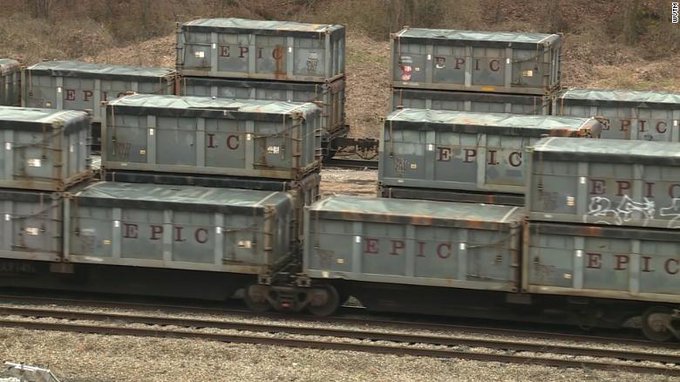Right now, dozens of train cars carrying 10 million pounds of poop are stranded in a rural Alabama rail yard. Technically it’s biowaste, but to the 982 residents in the small town of Parrish, that’s just semantics.
They want it gone. The load has been there for almost two months, and it’s making the whole place smell like a rotting animal carcass.
To add insult to injury, it isn’t even their poop. For the last year, waste management facilities in New York and one in New Jersey have been shipping tons of biowaste — literally, tons — to Big Sky Environmental, a private landfill in Adamsville, Alabama. But in January, the neighboring town of West Jefferson filed an injunction against Big Sky to keep the sludge from being stored in a nearby rail yard.
It was successful — but as a result, the poo already in transit got moved to Parrish, where there are no zoning laws to prevent the waste from being stored.
‘God help us if it gets hot’
Parrish Mayor Heather Hall said she is doing everything in her power to get the feculent freight out of her town.
“It’s so frustrating,” Hall said. Last week, Hall met with Alabama Gov. Kay Ivey, and she and other Montgomery lawmakers told Hall they would help get it sorted out. “They’re trying to work behind the scenes to get us a little bit of help, but we’ve been told that for weeks, and there’s still no solution.”
Hall said the stench permeates everything. The rail yard is across from a baseball field and next to a softball field. Parrish only measures about 2 square miles, and pretty much everything is within smelling distance.
“It greatly reduces the quality of life,” Hall said. “You can’t sit out on your porch. Kids can’t go outside and play, and God help us if it gets hot and this material is still out here.” On Tuesday, when Hall spoke to CNN, the temperature in Parrish reached 81 degrees.
“You can’t open your door because that stuff gets in your house. It’s really rough,” Parrish resident Robert Hall told CNN affiliate WVTM. Other residents said the waste smelled like dead bodies.
‘Is that not a public health issue?’
The Environmental Protection Agency and the Alabama Department of Environmental Management have both told Hall the material isn’t dangerous, because it’s supposed to be Grade A biowaste, not raw sewage (which is also the reason for the unique smell).
She’s willing to take them at their word, but that doesn’t mean she and other Parrish residents aren’t concerned.
“Other than it smelling absolutely terrible, I have to trust them that it’s not going to hurt you,” she said. “But if you have asthma or COPD or breathing problems, what is that going to do to you? [The rail yard] is probably less than 50 yards away from homes. What happens if flies get into someone’s house? Is that not a public health issue?”
Hall said her colleagues in the capital city of Montgomery have asked her not to file an injunction against the landfill, not that it would be a smart idea anyway; if they went to court over the matter, the other matter would just sit there, stinking up Parrish, until the trial was over.
‘They keep telling us the situation is almost over’
So, in short, nobody knows when the poop will be moved.
“I’m just getting little bits and pieces of information, and I cannot tell you how frustrating it is,” Hall said. “My understanding is, they are really trying to work on the problem, and they keep telling us the situation is almost over.”
Hall hasn’t been in contact with Big Sky for a few weeks. When she first spoke to the company, when the cars of waste were just beginning to be stockpiled in Parrish’s rail yard, they told her it would take seven to 10 days to move them out. That was two months ago.
CNN contacted Big Sky and is waiting to receive comment.
Parrish isn’t the only town on the waste route that has been dealing with the fetid fallout. According to AL.com, residents in Birmingham were livid when at least 80 train cars full of the sludge came to a stop in their city in January.
Hall said, at one point, there were 252 tractor-trailer loads of the stuff stockpiled in her town.
“People need to understand that this waste does not need to be in a populated area,” she said. “There are places to put it, industrial places. We’re a very small town caught in the middle of this, and I feel like that’s part of the issue here. This shouldn’t be happening.”

No comments:
Post a Comment